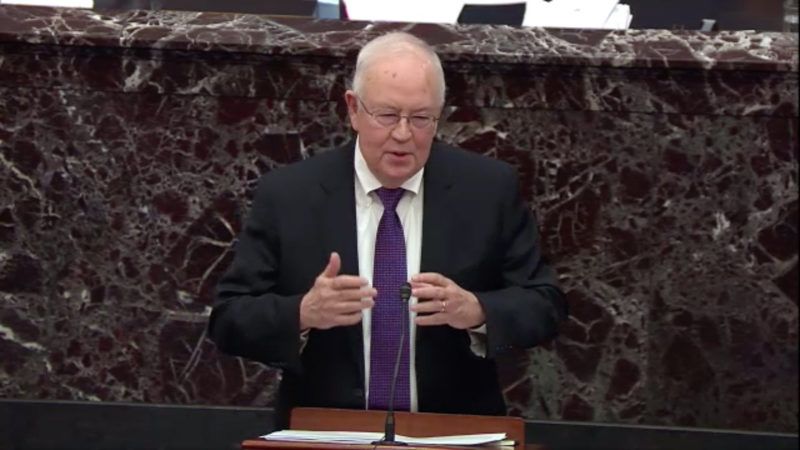Ken Starr, Who Led Clinton's Partisan Impeachment, Says Impeachment Should Be 'Powerfully Bipartisan'
He also likens impeachment to "domestic war."

Ken Starr, a member of President Donald Trump's impeachment legal defense team, argued during Trump's Senate trial today that the process must be "powerfully bipartisan" to be legitimate.
"Those of us who lived through the Clinton impeachment, including members of this body, full well understand that a presidential impeachment is tantamount to domestic war," he said.
Starr didn't just live through Bill Clinton's impeachment. He was the independent counsel whose investigation led to the charges levied against the former president. The House impeached Clinton in December 1998 on two counts of perjury, one count of obstruction of justice, and one count of abuse of power pertaining to his affair with former White House intern Monica Lewinsky.
It was not bipartisan.
On the first three articles, just five Democratic House reps defected from party lines and voted alongside Republicans. On the last article, only one did. A heavier bipartisan consensus actually cut against impeachment, with five Republicans voting against article one, 28 against article two, 12 against article three, and 81 against article four.
So was Starr bringing up the Clinton case in a "lessons learned" manner, suggesting that it shouldn't have been pursued at all? Not really. At most, his arguments today seemed to oscillate between a defense of the Clinton impeachment and a repudiation of it.
"The nation's most recent experience, the Clinton impeachment, even though severely and roundly criticized, charged crimes," Starr said—and those crimes were committed "beyond any reasonable observer's doubt." Trump's impeachment, he said in contrast, risks being "dominated by partisan considerations" because his articles contain no formal accusations of criminal misconduct.
But later, in a puzzling pivot, he seemed to say that not even criminal allegations merit the boot: "The very divisive Clinton impeachment demonstrates that, while highly relevant, the commission of a crime is by no means sufficient to warrant the removal of our duly elected president."
Meanwhile, Starr's 2018 book Contempt declared that "Abuse of Power stood at the center of The President's behavior."
This confusion may explain why the former independent counsel chose to focus instead on President Richard Nixon's impeachment inquiry when he drove his point home.
"In an overwhelmingly bipartisan vote of 410–4, the House of Representatives authorized an impeachment inquiry" into Nixon, Starr noted. "It bears emphasis before this high court: This was the first presidential impeachment in over 100 years."
The next one would come two decades later, with Starr at the helm.
Yet the removal of Richard Nixon was a fairly partisan affair too. "Contra Starr, presidential impeachments have always been partisan," notes the Cato Institute's Gene Healy. "Even in the Nixon near-impeachment, a majority of Republicans on the House Judiciary Committee voted against every article."
Partisanship is a powerful drug. Whether Trump deserves a guilty verdict has nothing to do with the political animus surrounding the process—something Starr should be acutely aware of.


Show Comments (47)